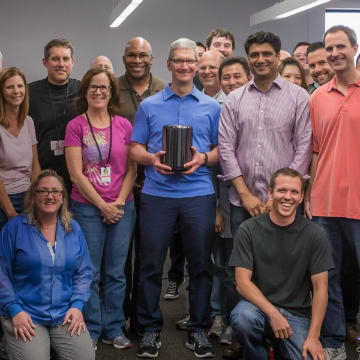
Section Branding
Header Content
How Do You Make The Tech Workforce More Diverse?
Primary Content

The struggle to increase diversity in the tech industry is once again in the spotlight this week. The Congressional Black Caucus invited industry representatives to Washington on Tuesday for the launch of CBC Tech 2020, a new initiative designed to get more African-Americans among the ranks of computer scientists and others working in STEM-based fields. (STEM stands for science, technology, education, and mathematics).
Is the tech sector reaching a key tipping point when it comes to the need to hire more people of color, as well as women, in the industry? And what does all this say about the state of science and technology education in the U.S.?
GPB’s Bradley George discusses this topic with science and technology correspondent Renay San Miguel.
· What are the elements of CBC Tech 2020, and is there anything different here?
According to the Caucus, the Tech 2020 initiative is basically a way to bring black lawmakers and the tech industry closer together to both look for ways to boost African American hiring. So we’re talking about networking and awareness efforts, setting up best practices, that kind of thing. But the idea is to get tech executives to use the same spirit of innovation and entrepreneurship that they do when they’re building new apps and hardware, and apply that kind of thinking in coming up with ways to boost hiring of African-Americans in the industry. That’s kind of a new approach – reaching out to executives like Apple’s Tim Cook, Facebook’s Mark Zuckerberg, Google’s Larry Page and saying, “You spend a lot of time building an Apple Watch, Google Glass, Facebook whatever; why can’t you bring that same passion and demand for quick results to diversity in hiring?” The Caucus also says that blacks are some of the major consumers of tech products, so the industry should do its part to balance things out within its ranks.
· Does any of this involve legislation designed to force the industry to be more inclusive?
Caucus representatives don’t think legislative mandates are the way to go. They say the industry realizes it has to do more in this area, so this is really about building a platform for lawmakers and execs to work together, help steer them to ways they can boost investment in black communities, highlight programs that are working, etc. The Caucus does want to introduce legislation that would pure more money and effort into increasing science, technology, math and engineering education – STEM education – in public schools, and that is a key part of this – getting more trained, skilled workers into the workforce as tech becomes even a bigger part of the economy. So there’s not anything mandatory here, but the Caucus may issue grades to the industry in the form of a regular report card regarding their diversity efforts.
· It seems like we’ve been talking about the need to get more people of color and women in tech for a while, but the rhetoric seems to have gone to another level over the past year. What’s prompted all that?
This has been an issue for a while, but you can probably thank the Rev. Jesse Jackson and his Rainbow PUSH organization’s efforts to get the A-list tech companies to voluntarily release data about diversity within their ranks. Those efforts finally bore fruit last year, and the results from Apple, Google and about 20 other companies showed that the percentages of women, Latinos and blacks both in the rank and file, and among executives, were woefully low. At Google, for example, blacks make up less than 1 percent of its workers. So there are more metrics backing up the arguments here. But then there have been highly publicized stories like Gamergate involving harassment of women in the gaming industry, and a variety of gaffes like Microsoft CEO Satya Nadella saying women should be more patient when it comes to equal pay, which he quickly walked back.
· Where does Atlanta and Georgia fit into all of this, especially when it comes to STEM education?
There’s a perfect storm of opportunities brewing in the South. First there’s the strength of the overall Georgia and Atlanta economy, which has always been pretty diverse. Then there’s a tech startup sector here that is in the process of expanding and getting the rest of the country’s attention, and it needs more developers and web designers. There are existing academic institutions like Georgia Tech, known for their leadership in providing STEM talent. And earlier this year the Obama administration announced $25 million in funding for cybersecurity education at historically black colleges and universities, including Clark Atlanta University and Paine College. Cybersecurity is one of the Georgia economy’s so-called tech “clusters,” along with marketing, financial tech and healthcare-related tech, where there’s an awful lot of entrepreneurship and investment.
Renay San Miguel hosts Sci-Tech Now Georgia on GPB-TV.
Tags: sci-tech-now georgia
